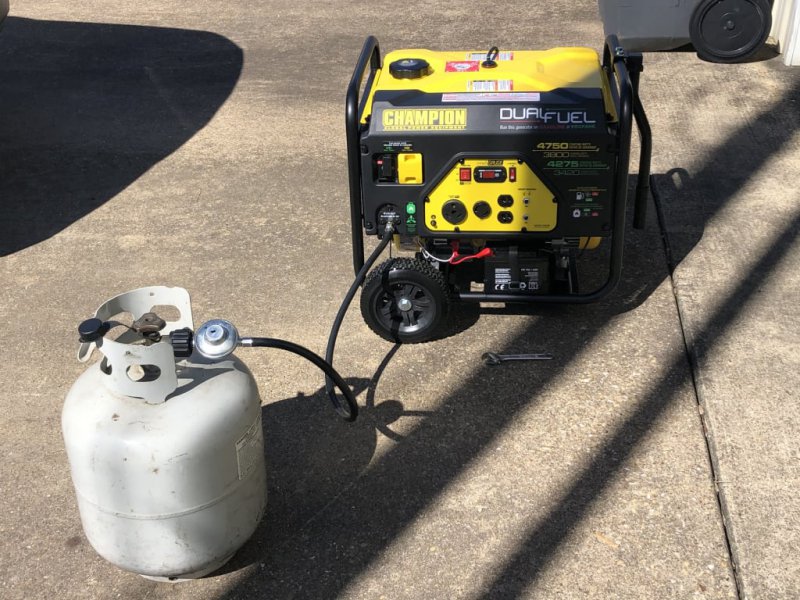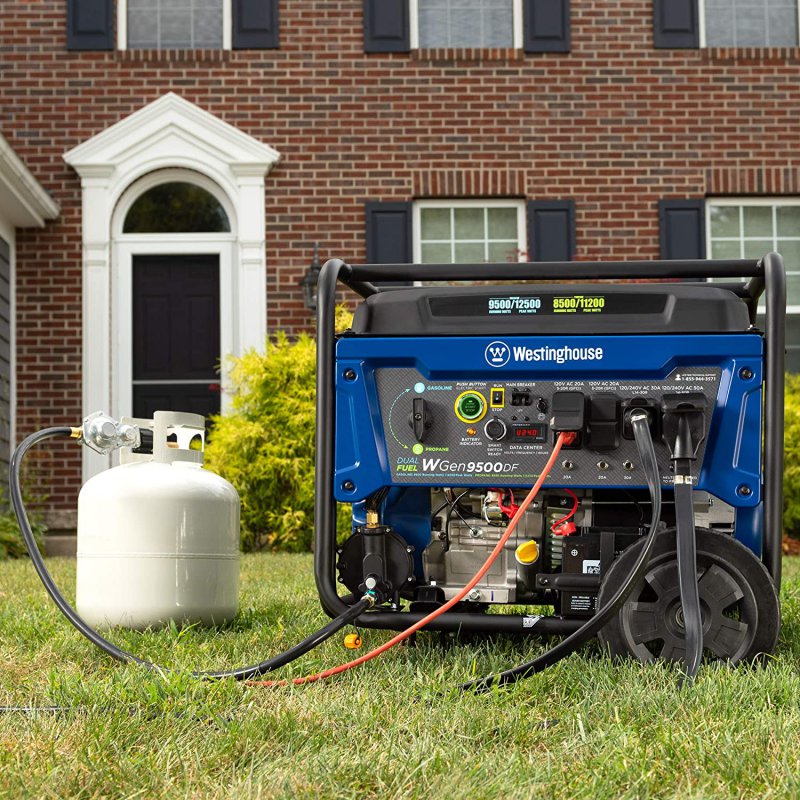When the power goes out, most people will instantly turn their generator on; and this is a modern age, and people can’t function if their electronics aren’t functioning.
A generator can keep the electronics of your house working, it can charge your phones and laptops, and if you work from home, then it will reduce the work downtime to next to nothing.
A generator isn’t only helpful at the house, but if you have a portable unit, then you can bring it along with you at your camping site, run your power tools at a job site, etc.
So, a generator is an essential device in a house. Now, most power outages you will face during the whole year will be brief in nature, and the electricity will be back in a few hours.
But, what if it doesn’t? What if the grid fails due to some intense natural disaster and the power supply gets disrupted for weeks.
For short periods of time, generators can power the whole house. Will it be able to supply electricity for an extended period, and if yes, then for how long. How long can you run a generator safely? We will provide all the answers in this post, so keep reading.
Table of Contents
Consider These Points Before We Begin
The first thing I would like to mention is that generators are designed to be used as a backup power source for a few hours when grid electricity is absent. It is not a permanent replacement for your electricity needs.
And also, you should not use it continuously for periods of days or weeks. If you do so, then you must give it a break now and then. Why? Because some constraints don’t make it a good idea to run the generator continuously.
First is the high cost of fuel. Whether you use a gasoline generator or propane generator, the operating cost will be many-fold than what you will pay for grid power. On top of that, maintenance and its cost is another hassle.
A generator might cost you anywhere between $50 to $250 per day, while the same power from the grid will only amount to approximately $4.
Another constraint is their lifespan, which mainly depends on how well it is maintained for how long it has been used. They won’t supply the power forever. And if you use them continuously, then their life will be reduced to a few years only, after that you will have to purchase a new one, which is also costly.
And the last thing is that you can’t use them continuously; they need time to rest. They have many mechanical parts which will fail without rest. Also, they will need to be stopped when fuel needs to be replenished.
You can’t fuel it instantaneously just after it has stopped, and it needs to cool down, which results in an interruption of power. So, it should be clear from the discussion that a generator is not permanent but is actually a backup solution for a power outage.
Fuel Consumption of a generator
The continuous runtime of a generator depends on many things, and fuel consumption is one of them. So if you want to find out how long a generator can run without rest, then you should know and understand how much fuel it consumes.
Moreover, there are different generators with different fuel types. A generator can use gasoline, propane, diesel, or natural gas.
Now, the generator will use the fuel based on the load it supplies at any instant and the stress level on the unit. Obviously, a generator will need to be stopped to be refueled, but the interval between two refueling sessions will be determined by its fuel consumption. Because if fuel is consumed at a higher rate, then the continuous runtime will be less and vice versa.
If we take a general example, then a 5000- watt generator will consume 2 to 3 liters of fuel every hour, which means for 24 hours of use, you will need 56 to 72-liter fuel. On the other hand, small generators consume less fuel; they require 1-liter fuel each hour approximately. So 24 liters of fuel will ensure a runtime of 24 hours.
The fuel is one deciding factor, more precisely, the size of a fuel tank. So, a bigger fuel tank means longer runtime. Also, due to an extended power outage, you run your generator continuously, then you will push it to its limits. So, the question remains, exactly for how long a generator can run continuously? Let’s ponder over it in upcoming sections.
How Long Can You Run Your Generator?

Most of the moderate-size generators in the market can provide runtime anywhere between 8 hours to 20 hours. That is a generator figure; some bigger generators will have a better runtime while some smaller generators will run only about 4 to 5 hours. The reason is the size of a fuel tank, and smaller units will have small fuel tanks.
This is because the runtime of a generator gets dictated by many things. The size of a fuel tank, fuel efficiency, maintenance needs, oil replacement, and connected load generally decides how long your generator will run.
A generator is a mechanical device that will surely need rest to function properly.
If they don’t get rest, then there are chances of a breakdown. So, you should not run your generator continuously for days, let alone weeks. In addition, the runtime will also depend on the type of fuel generator used.
If you want to get a general idea about the runtime of your generator, then divide the fuel tank size of the unit with the fuel consumption rate. These both will be mentioned in the owner’s manual.
Continuous Runtime of Different Type of Generators
In this section, we will explore how long you can run generators with different fuels and what limits this runtime.
Gasoline Generators

From gasoline generators, you can expect the least continuous runtime. That is because when they consume all the gasoline from the tank, they need to be refueled. And for refueling, you will need to stop the generator.
Someone might have told you when you purchased a gasoline generator not to refuel when it is running. Moreover, you will also need to let it cool down; if not, then it can result in a dangerous fire or explosion.
So, based on your fuel tank size, the runtime of your generator will be decided; it will also depend on the load connected to the outlets. You can expect any moderate size gasoline generator to offer a runtime ranging from 6 hours to 12 hours. There are also some units in the market with a bigger tank size that can run for up to 18 hours.
Propane Generators

You don’t have fuel limitations when it comes to propane generators. Unlike gasoline generators, where you will need to refuel the tank situated on the unit itself, propane generators don’t have that fuel tank.
They utilize fuel from a propane tank. This is advantageous, as there is no problem of fuel overflowing, so you don’t have to stop the generator when refueling.
A smart way to do this is to toggle to another propane tank when one gets depleted, and in the meantime, you can replace the depleted tank with the full one.
This is achieved by using a changeover regulator or stopcock valve. Assuming that you have a continuous supply of propane tanks, fuel isn’t the limitation here, then what is? It is oil.
Any generator can run for about 100 to 200 hours before the oil gets depleted. When that happens, when the oil level falls below a certain amount, then the generator turns itself off to protect the engine. Other than that, it will also need to be stopped for maintenance purposes after 100 to 150 hours of continuous use.
Other than that, there is also a problem with heat build-up. There won’t be any heat problems if a generator runs continuously for a whole day. But when this time exceeds, the heat slowly starts building up, which might damage the engine parts. And mind you, this damage will be permanent, so don’t take it lightly.
The heat problem can be countered using ice packs or using cooling fans, and it will keep the temperature in check. When the temperature is controlled, the only limiting factor is oil.
So, a propane generator can run continuously for about 150 to 200 hours, which is roughly a week. After that, you will need to do a maintenance check.
Standby Generators

Propane generators can run for about a week continuously, but if you want your generator to supply power for more than that, then the best option is to use standby generators.
Standby generators can run for more than a few weeks continuously, but they will need to be monitored carefully or you risk permanent damage to your unit.
They can do this long because they are designed to run for long hours, and they have powerful motors and durable mechanical parts. That is why you will find standby generators used in hospitals, malls, or police stations.
These generators will have a continuous supply of fuel from a direct connection to a natural gas line or a very large fuel tank. Standby generators will have a fuel tank that can store about 500 to 1000 gallons.
Depending on the brand, a standby generator can run continuously for up to 500 hours, and this means you will have continuous power for about 3 weeks.
But you will also need to keep in mind that running a generator for too much time can permanently damage it. The generator will break down. Moreover, unlike portable generators, they don’t require that frequent maintenance.
Maintenance Tips to Keep the Generator in Best Condition

It doesn’t matter whether your generator runs occasionally or continuously; it will need regular maintenance to keep it in the best condition. The maintenance schedule and instructions will be provided in the instruction manual, so it is best if you refer to it first.
Here are some maintenance tips which you can follow to maintain your generator.
Generator oil gets depleted or gets dirty, so it needs to be replaced or replenished after a certain time of use. You can inspect the oil after 100 hours of use. Other than that, the generator won’t work properly if the carburetor and engine get blocked by impurities in the fuel. So, you should store the fuel in a clean place and prevent exposure to air and dirt.
Not only fuel but the generator itself should also be protected from the dirt. If a generator is too dirty, then you should wipe it with a clean piece of cloth. Don’t make a mistake by using a water jet, and it can damage the insulation of other electronics components of the unit.
Moving on, if your generator vibrates too much or makes a rattling sound when it is running, then it is a sign that some part is loose. So, you will need to locate that part and tighten it up.
This can mitigate some problems before it rises. Other than that, if you face a starting problem, then a common reason may be a dirty spark plug. So, you should regularly clean it.
Besides spark plug, air filters will also need regular cleaning. You should check the air filter and clean it or replace it every month or two.
When you store the generator for an extended period, then you should run the generator periodically. This will ensure that the generator will function whenever you need it.
Conclusion
For how long a generator can run depends on many factors; as we have discussed, it depends on fuel efficiency, fuel tank size, the stress on the unit, and how much power it supplies. So, you can’t run your generator endlessly, and they will eventually run out of fuel or oil; that’s their stop point.
Moreover, no matter how long your generator runs, you will need to give it a rest. Otherwise, its lifetime will be reduced drastically. A portable generator working on gasoline has a continuous runtime of 8 to 12 hours, while the propane generator can run for a week without break and standby generators even longer.
They can run for a few weeks, but they need proper maintenance and monitoring, so it doesn’t break down.
Also, always refer to the generator manual before you let your generator for an extended period. If there is a limitation on generator runtime, then it is not a good idea to exceed that, and this can damage your generator permanently.





Hello Evans Miller,
Nice of u to take the time to tell us these things, I have two genz, one I bought in 2014 from northern tool and equipment a powerhouse 7250 running watt 9,000 surge other is a 5500 running. . . I maintain them both they start right up whenever I need’em to and every 2 months or so start an run with a good load and log it all kpg track of hours. The powerhouse workt the house when Irma tore her sorry ass thru st.pete in 2017, ran 10 days 16 hrs. a day every 3 days or 48 to 50 hrs she got her oil changed and a clean air filter. yup central a/c. stove top lites t.v. an a freezer. what was great was a cinderblock type home. lose power for 5 hours u will just start to know it, held the coolness great which meant less of a cooling load, then wed turn off a/c an run washing machine then dryer it was a gas job. take care of ur gen it will take care of u.